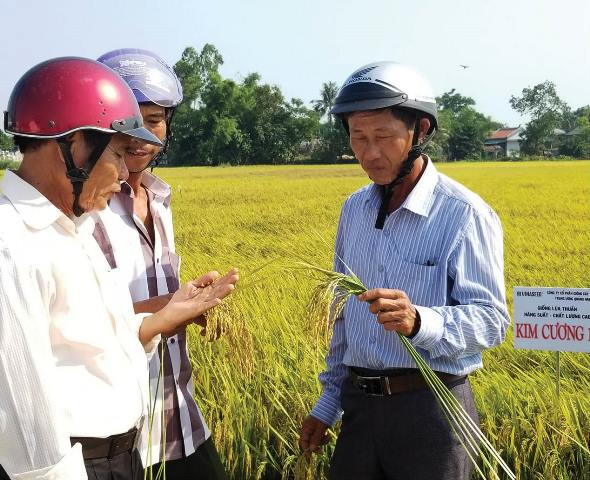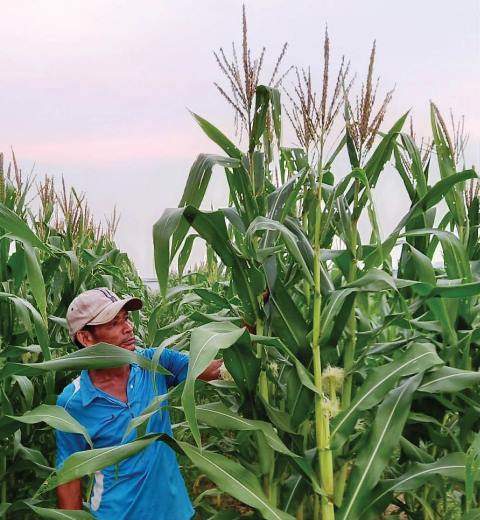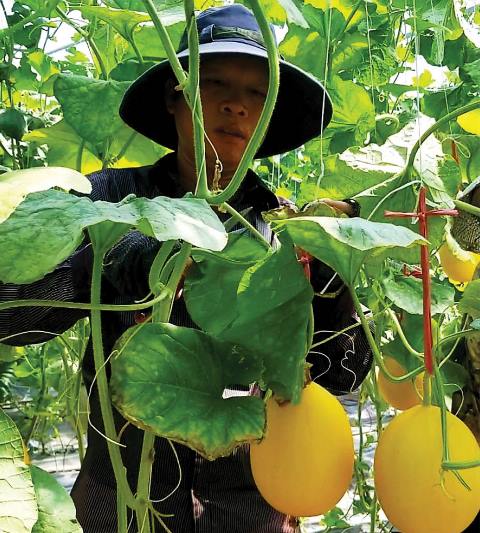
Improving the quality of rice varieties would create competitive products
Moving slowly
When the harvest season comes, there are still many issues relating to the farmers' products. There are several farmers selling their products to the cooperative, which means at the beginning of the crop, the cooperative has coordinated the consumption of the products with them. In contrast, the rest of the farmers depends on the "non-verified" market. When the pandemic is rife, the price of this product is inevitably fluctuating and depends on traders who can create countless reasons for farmers to be at a disadvantage stage.
Particularly, more than two months ago in Huong Phong commune, although dozens of tons of saltwater rice were connected to be consumed, they were still slowly purchased. The reason cited by the consumer units is that the number of products harvested by farmers is too much; meanwhile, the enterprises do not have enough human resources and machinery to purchase.
In this crop, harvesting is even more complicated during the pandemic, and no one can say in advance whether farmers' consumption partners will have any obstacles or not. "Except for the information seeking at the cooperative, we don't have many other places for the product consumption. Therefore, it is difficult for post-harvest products to shape the true nature of the price," shared Mr. Dang Van Hoa (Huong Phong commune).
Besides rice, for most of the crop products, farmers still have difficulty in quantifying the value.

The province's agricultural sector is still fragmented and small
Compared with the previous time, farmers have changed their agricultural production methods towards mechanization. Yet, when technology trends are gradually changing lives, farmers' production habits are still outdated.
The story of aquaculture in the south applying modern devices and sensors to control the farming process is worth learning. With those devices, these farmers can analyze factors such as water, food composition, brightness, etc., all are transferred to an application on the phone for the owner to adjust actively.
In Thua Thien Hue, the potential for aquaculture is considerably great when there is a large system of rivers and lagoons available for economic development. However, the investment in technology and the scientific content applied in practice is not high. The cultivation of farmers is still spontaneous,without any orientation; or, production awareness is likely to be in short-term.
"During the shrimp farming process, through many meetings and discussions with experts, I have known several equipment and applications to control the disease. However, our knowledge is not enough to apply these, so we have to apply the traditional farming method," said Mr. Le Si (owner of a shrimp farming household in Phong Dien).

High-tech agriculture is a sustainable development trend
Changing the face of the agricultural sector means gradually changing the mindset of farmers and digitizing the role of state management.
People have mentioned a lot about smart services, villages, and communes. Specifically, Quang Tho commune (Quang Dien district) is one of two localities selected to build a pilot smart commune. The construction of this model is bringing a new face to the local administrative management. However, when Quang Tho's economy is mainly based on agriculture, the digitization and application of technology in production is still limited.
Vice-Chairman of Quang Tho Commune People's Committee, Mr. Tran Kim, said, "The agriculture digitalization in the locality does not seem to have been formed due to many difficulties. Not to mention some products sold on the e-commerce platform, the farmers' product consumption process still meets some difficulties."
Starting with the key product
In agriculture, the processing industry plays an essential role to enhance product value. The authorities stated that due to the limited raw material and the fragmented production stage of farmers, the product quality is not high, creating barriers in attracting processing enterprises to coordinate.
In a proposal to the province on the issue of agricultural digitalization, Ms. Nguyen Thi Thanh Thuc, a member of the Executive Committee of the Digital Agriculture Association, said, "Digitalizing agriculture means digitalizing each household and creating a source of data from them. Hue has a diversity of topography, climate and soil, so it is possible to develop a variety of industries such as raising cattle, poultry, seafood, afforestation, long-term trees, short-term plants, and tropical vegetables and fruits".
However, according to Ms. Thuc, instead of growing all simultaneously, the agricultural investment and branding activities should choose to develop a few specific indigenous products, such as lotus.
Developing essential products means creating advantages to improve competitiveness. Recently, localities have also moved towards this trend and invested in developing specific products.
Accordingly, 25 products of 25 economic subjects with OCOP goods were recognized as three or four-star products by the Provincial People's Committee. Some of them also use QR codes in traceability. However, there is a lack of chain links between farmers and businesses. The connection of products for consumption on e-commerce platforms is still limited.
Besides the e-commerce platform deployed by the Provincial Cooperative Alliance in collaboration with the Provincial Rural Development Sub-Department, in domestic and foreign e-commerce channels, there are just a few Hue's products. Among them, the typical products are Co Ri (sea food) paste and Thuy Bieu "Thanh tra" - a local pomelo variety.
"The province's orientation to develop a high-tech agriculture is absolutely appropriate. However, it is necessary to apply information technology to form the foundation and store the product's brief "curriculum vitae". As a result, the transparency and reliability of the product would be enhanced. To achieve this, it is very important to have a road map and funding. Should it be better to start with the flagship products? Furthermore, during the time when the pandemic has created difficulties to the circulation process, it is necessary to speed up online consumption through e-commerce platforms," shared Dr. Le Tien Dung, an agronomist, former Dean of Faculty of Agronomy, University of Agriculture and Forestry, Hue University.
According to Mr. Nguyen Phuoc Tho, Chief of Office of the Department of Agriculture and Rural Development, the agricultural sector's digitalization has been oriented in the period of 2021-2025. Accordingly, it is the application of information technology that will contribute to restructuring the agricultural industry towards sustainability, increasing added value and competitiveness of agricultural products.
At a recent meeting with the Department of Agriculture and Rural Development, Mr. Phan Ngoc Tho, Standing Deputy Secretary of the Provincial Party Committee, emphasized, "The agricultural sector needs to promote the application of information technology and digital transformation, focus on protecting natural resources and environment and preserving the natural landscape. Furthermore, it is important to apply science and technology in production and seedlings, promote the application of high technology, digital technology and information technology in all stages of the value chain, and synchronously connect with other industries and fields to form smart agricultural production."
Story and photos: Quynh Vien